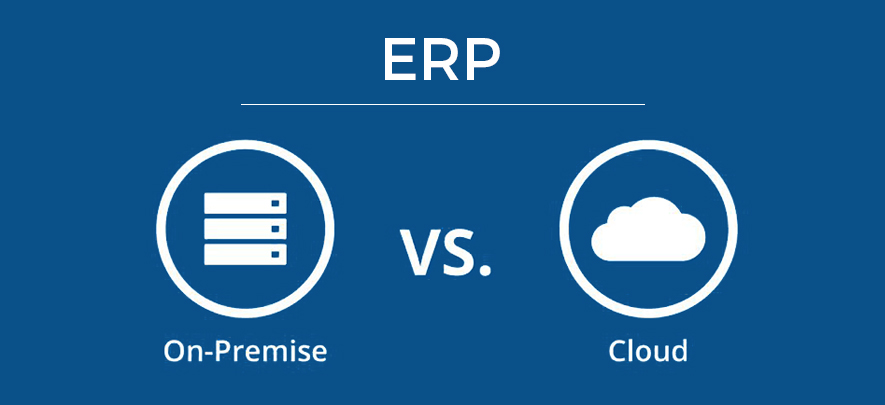On-Premise ERP vs Cloud ERP

Digital & Technology
368 week ago — 6 min read
Summary: Karan Aggarwal analyses the choices available to an SME when looking at Enterprise Resource Planning (ERP) options for their business. He compares cloud ERP and on-premise ERP across six parameters. Read further to make an informed decision for your business.
ERP refers to Enterprise Resource Planning software. ERP helps in the operation of organisations and businesses. While the benefits have been proven, chances are that you’ll be overwhelmed with choices while considering an ERP system for your organisation. As you consider your options, one of the most critical factors in your decision will be whether you choose cloud ERP or on-premise ERP.
The basic difference between these two systems is how they are deployed. On-premise ERP solutions are installed locally on your company's hardware and servers and then managed by your IT staff while cloud ERP—also called SaaS, or Software-as-a-Service—is provided as a service. It is managed centrally (on the Internet "cloud") by the ERP vendor and is accessed by customers using a web browser.
1. System control and integration
Cloud ERP is typically managed by a third party unlike to an on-premise ERP system. An on-premise ERP, in turn, requires more technical staff to support. But on-premise ERP also brings in a higher degree of control over information and data.
Usually, cloud ERP systems are quite customisable, which lets you match your organisation look and feel supporting your unique functionality. For on-premise systems, on the other hand, customisation and integration are limited as compared to cloud ERP. At some level, most on-premise and cloud ERP software systems offer integration due to the increasing needs of transferring data between applications.
2. System updates and enhancements
Cloud ERP system, typically receives updates more frequently than on-premise ERP systems, so one can be sure of always using latest and advance version of ERP system. Customisations and integrations are automatically carried forward with an update of the system. Whereas in case of on-premise ERPs customisations are tied to the current version of the software and its deployment. An update here means the technical staff would have to redo the customising of the software. This is one of the major reason companies avoid upgrading their on-premise ERP systems.
3. System performance and accessibility
Cloud ERP often delivers better performance than on-premise solutions. Cloud ERP offers optimised performance and scalability i.e. It can adjust meet the business needs. Moreover, cloud ERP is accessed through the web without the requirement of any IT infrastructure. Information is accessible to the staff on their laptops, smartphones, tablets and other devices. Whereas the on-premise ERP can be accessed through the Internet or private networks using terminal server or other remote access technology.
Not only can cloud-based ERP provide better performance and greater accessibility, but better security as well.
4. Cost of ERP and payment timeline
Choosing an on-premise ERP simply means, purchasing a license to use the ERP and pay a single upfront payment. One also needs to pay annual support fees that cover system upgrades, bug fixes, etc. Access to the provider’s help desk is included too. Whereas choosing a cloud ERP means agreeing to regular payments, usually monthly. Often there is no upfront payment required. Your payments go on as long as you use the cloud ERP.
There is usually a higher initial investment in on-premise ERPs and on the other hand cloud ERPs allow attractive pricing because of economies of scale, lesser IT infrastructure requirements, fewer upgrade of hardware required and quicker deployment.
5. Deployment speed
ERP implementation process requires time and rigorous and diligent planning, yet cloud ERP clearly has an edge over on-premise ERP when you consider the speed of deployment. Cloud ERP requires no additional hardware and thus your business doesn't have to invest time in installing IT infrastructure. Cloud ERP can be easily rolled out across multiple regions avoiding the cost associated with those rollouts.
Cloud-based ERP systems are also easily scalable, making it more flexible to add more users as your business grows. On-premise ERP solutions don't offer such freedom.
6. Post implementation support and service
Cloud ERP is inclusive of help and support subscription. ERP vendors keep your system upgraded with latest advancements and provides services like instant bug fixes and software improvements.
On the other hand, in case of on-premise ERP, maintenance of ERP requires additional support services, you will have access to the same improvements and bug fixes, but your IT staff will need to load those upgrades. You can, however, defer revision upgrades when you find nothing in that upgrade applies to your business or there could be a problem with some customisation.
Both cloud and on-premise ERP are excellent choices in the right circumstances. Every business is unique, so taking the time to consider how different ERP deployment options will affect your company is critical.
To explore business opportunities, link with us by clicking on the 'Invite' button on my eBiz Card.
Disclaimer: The views and opinions expressed in this article are those of the author and do not necessarily reflect the views, official policy or position of GlobalLinker.
Posted by
Karan AggarwalI am looking to connect with other business professionals. I am keenly interested in digital marketing, business development, operations, strategy planning, etc. Invite me to...
View Karan 's profile
Other articles written by Karan Aggarwal
Drupal vs WordPress for hosting your website
363 week ago
Most read this week













Comments
Share this content
Please login or Register to join the discussion